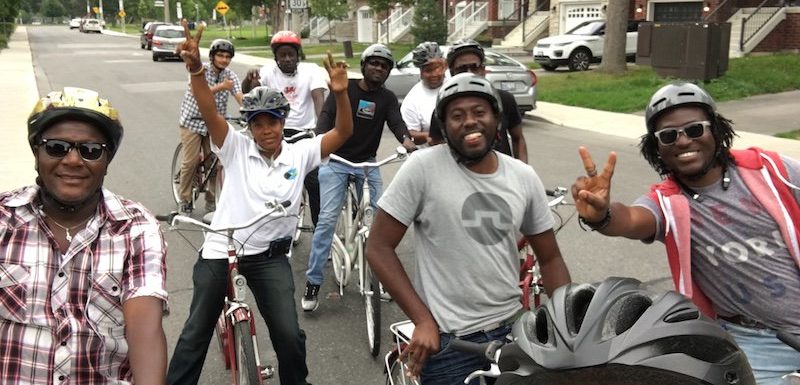Clean Air Partnership & Access Alliance Multicultural Health and Community Services: Community Bicycle Hubs

Projects Sponsor
Transportation is one of Canada’s top greenhouse gas producers. Reducing those emissions is key to fighting climate change and cycling is one of the best ways to get people out of their cars. For the most part, every bike on the road is one less car on the road, or at least one less person on the bus. Downtown Toronto, at least in enthusiasm—if not quickly enough in infrastructure—is steadily embracing cycling as the fastest, most pragmatic, low-carbon way for a good many people to get from point A to point B, but, while cycling is on the rise in urban centres, it’s on the decline in Toronto’s suburbs.
That’s an issue that needs to be addressed and The Centre for Active Transportation (TCAT) at Clean Air Partnership isn’t spinning its wheels. TCAT recognized the untapped potential of suburban cycling where others might have missed the light.
After all, Toronto’s 2001 bike plan called for a bikeway network of 1000km covering the entire city, but implementation of this plan flagged and suburban areas still lack cycling infrastructure suitable for commuting. Yet 69% of Torontonians live in suburban areas. If Toronto is to truly become a Cycle City, change in suburban areas is needed.
TCAT’s team focused their efforts in Scarborough, which comprises 30% of Toronto’s landmass, houses 24% of Toronto’s residents, and where over 300 supporters came out for the May 2014 opening of the North Scarborough Green Loop, a signed network connecting trails through L’Amoreaux and Agincourt. Their project, “Scarborough Cycles: Building Bike Culture Beyond Downtown” (at the outset of the Scarborough Cycles project TCAT negotiated a collaborative agreement with each of the partner organizations: Cycle Toronto, Toronto Cycling Think & Do Tank at the University of Toronto, and CultureLink Settlement and Community Services) aims to tackle barriers and spark cycling adoption outside the downtown core where the potential for cycling seldom gets even a nod.
There are a great many misconceptions about Toronto’s suburban communities and one of them is that everyone’s always got a long way to go to get anywhere, meaning getting there by bike is not a practical option. In reality, TCAT’s research showed that in Etobicoke, Scarborough, and North York, 1.5 million trips made each day are 5 km long or less. That’s an easy bike ride, but it’s one that most residents there aren’t taking and that’s not because, as is often assumed, everyone in the suburbs owns a car and drives everywhere.
TCAT’s research found that in many Scarborough neighbourhoods over a quarter of households have neither a car nor convenient, accessible public transportation options, but while the solution might seem obvious, it’s not as easy as saying “On your bike!”
There are obstacles in getting people in the suburbs cycling. People are understandably hesitant to try cycling because wide, high-speed roads designed for a car-dependent lifestyle, coupled with a lack of bike lanes can make getting on a bicycle feel like taking your life into your own hands. It’s no wonder that cycling, such as it exists in suburban areas is often seen as a more of a healthy leisure activity to be done on dedicated trails, rather than a means of transportation. A way of getting a workout, not getting to work.
At the same time, it’s difficult for these communities to find the public support and the political will to build bike lanes that address many of these legitimate safety concerns when it can look as if hardly anyone’s going to use them. It’s a bit of a catch 22 and while cyclists certainly need a safe place to ride, infrastructure alone won’t get people on their bikes.
Social supports that signal that cycling is a legitimate form of transportation need to be put in place and so what TCAT did was ask themselves what can be done to support cycling in neighbourhoods where very few people actually cycle, to address barriers that exist over and above the obvious lack of bike infrastructure? They went back to the basics, to the elements that make cycling inviting, many of which downtown residents might take for granted.
That means access to a bicycle, repair services, route knowledge, cycling skills, to name a few of the elements TCAT helped to put in place. They set about creating a supportive community where people can meet other people who cycle, learn more about cycling, and give cycling a try and the success of the project has surprised even them.
In 2017 and 2018, their newly created community bike hub project repaired over 2,000 bicycles, led over 1,000 people on bike rides, and trained over 200 people in cycling skills. Repeat participants reported more trips by bike. In 2017 alone Scarborough Cycles enabled more than 800 people to build, repair or borrow a bike and, in the process, build a commitment to cycle in the future.
Scarborough Cycles continues to grow and thrive, now under the direction of Access Alliance Multicultural Health and Community Services, with another location opening last year. In 2019 TCAT expanded the program to Markham and released a suburban community bike hub guide to help others replicate their success.
That’s a lot of effort, a lot of thought, a lot of promise and a lot of change. All something to think about next time you say “It’s as easy as riding a bicycle.”













